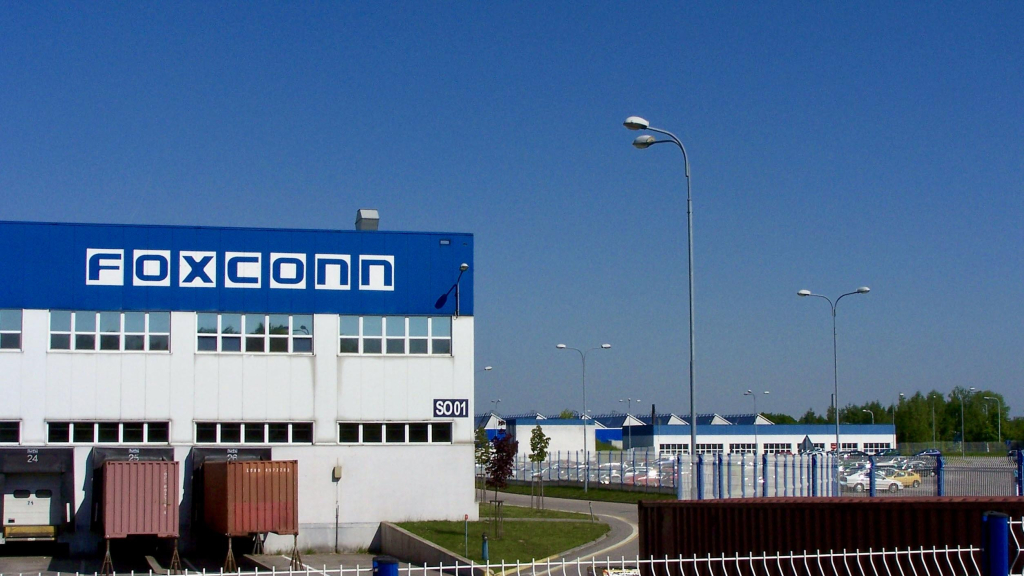Taiwan’s Foxconn, the world’s largest contract electronics manufacturer, reported its highest-ever third-quarter revenue, fueled by soaring demand for artificial intelligence (AI) servers.
The company, best known as Apple’s primary iPhone assembler, posted an impressive 20.2% year-on-year growth, with revenue reaching T$1.85 trillion ($57.3 billion). This exceeded both company forecasts and the T$1.79 trillion LSEG SmartEstimate, which shows predictions from the most consistently accurate analysts.
AI Demand Powers Growth
Foxconn’s success this quarter is largely attributed to the booming demand for AI servers, driven by its strong partnerships with key players in the AI ecosystem, including Nvidia. The company’s cloud and networking products division benefited from this surge, helping drive robust growth. While the smart consumer electronics sector, which includes iPhones, experienced a strong quarter-on-quarter performance thanks to new product launches, its year-on-year performance remained flat.
This third-quarter growth is especially significant as it coincides with the traditional peak season for Taiwan’s tech industry. During this period, major electronics manufacturers ramp up supply to fulfill orders from key global vendors, including Apple, as Western markets prepare for the year-end holiday season.
Strong September Performance and Promising Outlook
September alone saw Foxconn report revenue of T$733 billion, a 10.9% year-on-year increase, making it the second-highest month on record. As the peak season intensifies, the company remains optimistic about continuing momentum into the fourth quarter. Although it refrained from providing specific forecasts, Foxconn noted that its performance in the last quarter of the year is expected to align with market expectations.
Stock Market Gains Reflect Investor Confidence
Foxconn’s impressive financial performance has been mirrored by its stock market success, with shares soaring 86% this year, far outperforming the broader Taiwan market, which has risen by just 24%. The company’s stock closed 3.7% higher ahead of the revenue announcement, in contrast to a 0.4% drop in the benchmark index.
Looking ahead, Foxconn is set to unveil its full third-quarter earnings report on November 14. Additionally, it will host its annual Tech Day on October 8-9, where new product launches and partnerships are expected.

What’s Driving Foxconn’s Success?
Foxconn’s ability to consistently exceed market expectations is the result of several key factors:
Mass Production and Economies of Scale: By focusing on mass production for multiple original equipment manufacturers (OEMs), Foxconn has mastered economies of scale, enabling lower production costs.
Quick Delivery: Foxconn’s agile “built-to-order” manufacturing process ensures that it can deliver products swiftly and in large quantities.
Global Inventory Control: With exceptional global inventory management, Foxconn can efficiently meet the demands of its worldwide clientele.
Precision Manufacturing: Specializing in high-volume, precision manufacturing has allowed Foxconn to maintain its position as a key player in the tech supply chain.
Diversification into High-Growth Industries: In addition to its dominance in electronics, Foxconn is strategically expanding into fast-growing sectors such as electric vehicles, digital health, and robotics.
Expansion into India: Foxconn’s investments in India have paid off, with significant growth in revenue and production capacity. A new mega-factory outside Bengaluru will focus on iPhone production, while the company also explores opportunities in AI servers and Pixel smartphones.
Foxconn’s India Story, Moving Up the Value Chain into ICT, EVs, and Digital Health
Foxconn is making significant strides in India, expanding beyond its well-known role as a smartphone assembler. The company is shifting its focus toward sectors like information and communication technology (ICT), electric vehicles (EVs), energy, and digital health as part of its next phase of growth in the country.
During the inauguration of Foxconn’s massive industrial housing project in Sriperumbudur, Foxconn Chairman Young Liu outlined the company’s vision for India. “Foxconn is very well known for its vertical integration capabilities. Definitely, we want to move up on the value chain as much as we can in India. That’s what we will be doing in the ICT sector,” he stated.
Expanding Beyond Smartphones in a Strategic Shift
While Foxconn’s current India operations primarily revolve around smartphone production, including iPhones, the company is now broadening its scope. Liu emphasized that Foxconn’s future growth in India would not be limited to ICT. The company is also exploring opportunities in the EV and energy sectors, including battery production, which aligns with Foxconn’s broader EV strategy. Additionally, Foxconn plans to tap into the digital health industry, focusing on personal wearable devices, home medical devices, and cloud-based systems for hospitals.
Liu also highlighted the importance of generative artificial intelligence (GenAI) in Foxconn’s future strategies. He noted that GenAI would play a “very big part” in their operations, enabling breakthroughs and making “a lot of impossible things possible.”
In addition to its manufacturing ambitions, Foxconn is planning to replicate its successful township model from countries like Taiwan and China in Tamil Nadu. The industrial parks will include housing projects for employees, enhancing overall efficiency and productivity. “We think this kind of township will eventually bring value not just to the employees but also to Foxconn and Foxconn’s customers because the efficiency will be much better,” Liu explained.
Foxconn is looking to set up more housing and industrial facilities outside Chennai, indicating a broader commitment to expanding its presence in Tamil Nadu and beyond.

Foxconn’s Commitment to India’s Growth Story
With its growing presence in India, Foxconn is positioning itself as a key player in the country’s economic growth. “No company can ignore India,” Liu remarked, underscoring Foxconn’s commitment to being an integral part of India’s development.
Foxconn has already announced plans to invest heavily in India. The company’s Indian subsidiary is set to spend Rs 1,200 crore to build a new factory on company-owned land. This follows Foxconn’s construction of a mega-factory outside Bengaluru, which is expected to focus primarily on iPhone production.
In addition to its smartphone assembly operations, Foxconn is eyeing new product segments like AI servers and Google’s Pixel smartphones. This signals Foxconn’s intent to diversify its manufacturing portfolio in India and cater to the rising demand for advanced technologies.
Chip Packaging and Testing, A New Venture
Furthering its technological footprint in India, Foxconn has also joined forces with IT giant HCL Group to invest $37.2 million in establishing a chip packaging and testing facility. This move comes after Foxconn’s earlier joint venture with the Vedanta Group fell through, but it signals the company’s continued interest in India’s burgeoning semiconductor market.
Snapshot
Foxconn’s record third-quarter performance is exemplified by its ability to adapt to shifting market dynamics and leverage new growth opportunities in the AI space. With its strong supply chain capabilities, diverse portfolio, and strategic expansion into emerging markets, the company is well-positioned to continue delivering impressive results in the quarters ahead.
Foxconn’s expansion plans in India mark a new chapter in its global growth story. By moving up the value chain and investing in ICT, EVs, energy, and digital health, the Taiwanese manufacturing giant is demonstrating its commitment to the Indian market. With new factories, industrial parks, and partnerships, Foxconn will play a critical role in India’s technological and industrial evolution, further solidifying its presence in one of the world’s fastest-growing economies.









